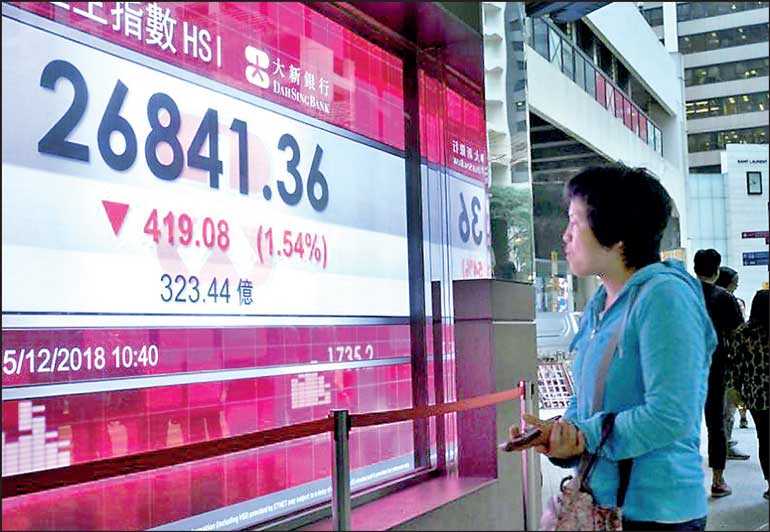Saturday Feb 21, 2026
Saturday Feb 21, 2026
Friday, 7 December 2018 00:00 - - {{hitsCtrl.values.hits}}

REUTERS: Emerging markets shares were on track to post their worst day in three-weeks on Thursday, as Asian shares tumbled after the arrest of an executive of Chinese tech giant Huawei at the request of the United States.
Meng Wanzhou, global chief financial officer of Huawei and founder Ren Zhengfei’s daughter, faces extradition to the United States after being arrested in Vancouver on Wednesday on charges of alleged violations of US sanctions.
The arrest comes just days after US President Donald Trump and Chinese President Xi Jinping agreed to a temporary ceasefire in their trade war to give more time for negotiations.
MSCI’s index for emerging market stocks fell 2.3 percent, dragged by losses in China , Hong Kong, Taiwan and South Korea , as tech stocks got jolted across the board over Wanzhou’s arrest.
“This news is quite significant as the US government is attempting to persuade allies to stop using Huawei equipment due to security fears, which is triggering a sell-off in tech,” Stephen Innes, head of trading, Asia-Pacific at OANDA, said in a note.
Huawei, one of the world’s top telecommunications equipment makers, has faced difficulties in the US market in the past over allegations its equipment may contain backdoors that could enable unauthorised surveillance. Developing world currencies also slid against the dollar as weak sentiment dragged the trade-exposed Chinese yuan and South Korean won lower by 0.4 percent each.
“This is a risk off environment and an escalation of the trade war without a doubt,” said Nordea Markets Analyst Morten Lund. “This (Huawei) is negative news and as we move through the day EM currencies will suffer because of this.” The Turkish lira, Indian rupee and Indonesian rupiah, all fell between 0.6 percent and 0.8 percent as lower global oil prices did little to benefit currencies of the net crude importers.
Russia’s rouble also weakened while Moscow’s benchmark stock index fell ahead of an OPEC meeting that could move global oil prices.
The South African rand slipped 0.3 percent as data showed the country’s current account deficit widened slightly to 3.5 percent of gross domestic product (GDP) in the third quarter.
The currency is expected to erase a third of the 10 percent it has gained in the past two months in the run-up to the upcoming May elections as strong volatility rattles the currency, a Reuters poll found on Thursday.
In Eastern Europe, the Hungarian forint was marginally lower against the euro. The country’s unadjusted industrial output rose in October following a 0.6 percent decline in September, preliminary data from the Central Statistics Office showed on Thursday.